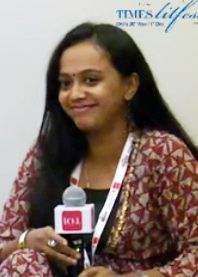Anuja Chandramouli | |
|---|---|
 Anuja Chandramouli, Times Lit Fest, 2019 | |
| Born | 1984 (age 40–41) |
| Nationality | Indian |
| Citizenship | India |
| Alma mater | Women’s Christian College Chennai |
| Genres | Fantasy Historical fiction |
| Notable works | Arjuna: Saga of a Pandava Warrior Prince (2012) |
| Children | 2 |
Anuja Chandramouli (born 1984) is an Indian author of fantasy and historical fiction.
